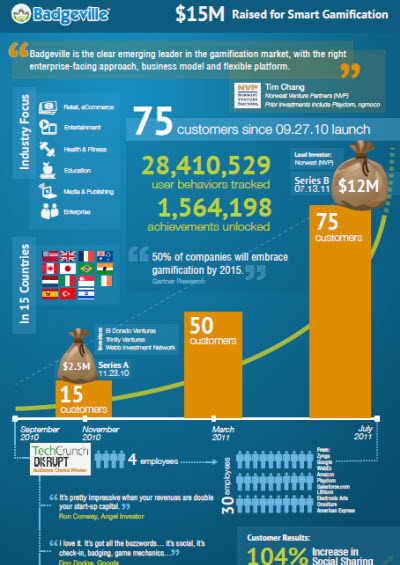 Gamification startup Badgeville has raised $12 million in a second round of funding to add game-like features to non-game applications.
Gamification startup Badgeville has raised $12 million in a second round of funding to add game-like features to non-game applications.
Kris Duggan, chief executive of Menlo Park, Calif.-based Badgeville, said that the funding will help the company accelerate its growth and help it leave the other dozen or so gamification startups behind.
With its Dynamic Game Engine and Widget Studio, Badgeville makes it easy for companies to increase customer loyalty and engagement in a way that can easily be measured. Badgeville lets its customers shower their users with social rewards and achievements, and it typically improves key user-driven objectives such as retention by 30 percent, Duggan said. The company recently launched version 2.0 of its engine platform.
Norwest Venture Partners and El Dorado Ventures led the investment, and existing investors Trinity Ventures and Webb Investment Network also participated. Tim Chang of Norwest and Tom Peterson of El Dorado will join Badgeville’s board.
“This investment comes [on] the heels of two consecutive seven-figure sales quarters, and 40 percent quarter over quarter growth,” said Duggan, who unveiled the funding at the GamesBeat 2011 conference in San Francisco today. He said Badgeville plans to use the new funds to expand its team and scale up its offering.
 In a survey of 2,000 workers, Saatchi & Saatchi reported that 83 percent of respondents said that they were interested in working for a company that used gamification as an incentive.
In a survey of 2,000 workers, Saatchi & Saatchi reported that 83 percent of respondents said that they were interested in working for a company that used gamification as an incentive.
Badgeville debuted last fall and now has more than 75 paying customers from e-commerce, media and entertainment, education, fitness, service and the enterprise. The customers include Discovery Communications, NBC, Bluefly.com, Interscope Records, Major League Gaming, LiveMocha, The Active Network, and Deloitte Digital.
Duggan said he believes the company can grow to several hundred customers by the end of next year. He said the company is striving to be easy to work with by using software-as-a-service tactics, much like Salesforce.com, the cloud sales services company. While other companies do a lot of custom work and others have a lot of automation, Badgeville likes to position itself in the middle.
“We needed to get more ammunition into the company to scale the business and be recognized as the clear leader,” Duggan said in an interview. “Our plan is to be the Salesforce.com of gamification.”
Norwest’s Chang, who is also speaking onstage this week at GamesBeat 2011, said he’s been speaking actively about gamification for a couple of years now, all the while seeking the right investment opportunity in the field. He said, “Badgeville is the clear emerging leader in this space, with the right enterprise-facing approach, business model and flexible platform.”
Menlo Park, Calif.-based Badgeville plans to grow from 30 employees to 50 this year. It has already hired alumni from Zynga, Playdom, Omniture, Google and American Express. Rivals include Bunchball and Big Door Media. Duggan said he believes more brands and enterprises are going to invest heavily in gamification in the next 18 months.
As we noted in our earlier story on Badgeville, some critics have said gamification is a superficial way to get customers to engage with web sites. They say it is a fad. Duggan acknowledges its benefits shouldn’t be exaggerated.
“You won’t turn all of enterprise software into a game,” he said. “You can make it a little more game like, make it more fun, make it meaningful, genuine and desirable.”
Eric Bahn, founder of the Beat the GMAT website, said in an earlier interview that his company chose Badgeville to gamify its new web site because it was the most flexible, was easy to deploy and was innovative. It took around three months to implement, but mainly because the company was one of the first to test the new Badgeville platform.
The company turned on the new gamification features last week and saw an immediate bump in the number of users earning achievements. The engine helped Beat the GMAT, which helps students prepare for business school tests, offer numerous campaigns and increase its revenue per user through a variety of partnerships.
Beat the GMAT also has 70,000 pages of educational content that has to be tagged. Through Badgeville, Beat the GMAT is offering users badges and other incentives to tag all of the content so it can be more easily discovered in searches.
Market researcher Gartner said it expects that more than 70 percent of the top 2,000 worldwide companies will have at least one gamified application by 2014. Badgeville raised $3 million previously.
VentureBeat's mission is to be a digital town square for technical decision-makers to gain knowledge about transformative enterprise technology and transact. Learn More
